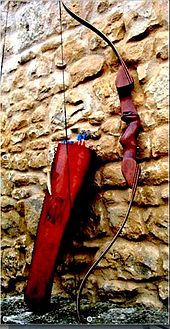quiver
English[edit]
Pronunciation[edit]

- (Received Pronunciation) IPA(key): /ˈkwɪvə/
- (General American, Canada) enPR: kwĭˈvər, IPA(key): /ˈkwɪvɚ/
Audio (GA) (file) - Rhymes: -ɪvə(ɹ)
- Hyphenation: quiv‧er
Etymology 1[edit]
From Middle English quiver, from Anglo-Norman quivre, from Old Dutch cocare (source of Dutch koker, and cognate to Old English cocer (“quiver, case”)), from Proto-West Germanic *kokar (“container”), said to be from Hunnic,[1] possibly from Proto-Mongolic *kökexür (“leather vessel for liquids”); see there for more. Replaced early modern cocker, the inherited reflex of that West Germanic word.
Noun[edit]
quiver (plural quivers)
- (weaponry) A container for arrows, crossbow bolts or darts, such as those fired from a bow, crossbow or blowgun.
- 1598–1599 (first performance), William Shakespeare, “Much Adoe about Nothing”, in Mr. William Shakespeares Comedies, Histories, & Tragedies […] (First Folio), London: […] Isaac Iaggard, and Ed[ward] Blount, published 1623, →OCLC, [Act I, scene i], line 271:
- Don Pedro: Nay, if Cupid have not spent all his quiver in Venice, thou wilt quake for this shortly.
- 1786, Francis Grose, A Treatise on Ancient Armour and Weapons, page 39:
- Arrows were carried in quiver, called also an arrow case, which served for the magazine, arrows for immediate use were worn in the girdle.
- (figuratively) A ready storage location for figurative tools or weapons.
- He's got lots of sales pitches in his quiver.
- (obsolete) A vulva.
- (obsolete) The collective noun for cobras.
- (mathematics) A multidigraph.
Derived terms[edit]
Translations[edit]
| |||||||
|
Etymology 2[edit]
From Middle English quiver, cwiver, from Old English *cwifer, probably related to cwic (“alive”).
Adjective[edit]
quiver (comparative more quiver, superlative most quiver)
- (archaic) Nimble, active.
- c. 1596–1599 (date written), William Shakespeare, “The Second Part of Henry the Fourth, […]”, in Mr. William Shakespeares Comedies, Histories, & Tragedies […] (First Folio), London: […] Isaac Iaggard, and Ed[ward] Blount, published 1623, →OCLC, [Act III, scene ii], line 281:
- [...] there was a little quiver fellow, and 'a would manage you his piece thus; and 'a would about and about, and come you in and come you in.
Etymology 3[edit]
From Middle English quiveren, probably from the adjective.
Verb[edit]
quiver (third-person singular simple present quivers, present participle quivering, simple past and past participle quivered)
- (intransitive) To shake or move with slight and tremulous motion.
- c. 1588–1593 (date written), William Shakespeare, “The Lamentable Tragedy of Titus Andronicus”, in Mr. William Shakespeares Comedies, Histories, & Tragedies […] (First Folio), London: […] Isaac Iaggard, and Ed[ward] Blount, published 1623, →OCLC, [Act II, scene iii], line 12:
- 1712 (date written), [Joseph] Addison, Cato, a Tragedy. […], London: […] J[acob] Tonson, […], published 1713, →OCLC, Act I, scene iv, page 2:
- And left the limbs still quivering on the ground.
- 1851 November 14, Herman Melville, chapter 84, in Moby-Dick; or, The Whale, 1st American edition, New York, N.Y.: Harper & Brothers; London: Richard Bentley, →OCLC, page 410:
- Next moment with a rapid, nameless impulse, in a superb lofty arch the bright steel spans the foaming distance, and quivers in the life spot of the whale.
- 1919 October, John Galsworthy, chapter VIII, in Saint’s Progress, London: William Heinemann, published December 1919, →OCLC, part III, page 300:
- And the moonlight on the Church seemed to shift and quiver—some pigeons perhaps had been disturbed up there.
Derived terms[edit]
Translations[edit]
|
References[edit]
Further reading[edit]
Middle English[edit]
Etymology 1[edit]
From Anglo-Norman quivre, from Old Dutch cocare; perhaps ultimately from Proto-Mongolic *kökexür or Hunnic.[1] Doublet of coker.
Alternative forms[edit]
Pronunciation[edit]
Noun[edit]
quiver (plural quivers)
- A quiver (a receptacle for arrows)
- (rare, vulgar) A vulva.
Descendants[edit]
- English: quiver
References[edit]
- “quiver, n.”, in MED Online, Ann Arbor, Mich.: University of Michigan, 2007, retrieved 2018-05-04.
- ^ “quiver”, in The American Heritage Dictionary of the English Language, 5th edition, Boston, Mass.: Houghton Mifflin Harcourt, 2016, →ISBN.
Etymology 2[edit]
From Old English *cwifer, probably related to cwic (“alive”).
Alternative forms[edit]
Pronunciation[edit]
Adjective[edit]
quiver
Descendants[edit]
- English: quiver
References[edit]
- “quiver, adj.”, in MED Online, Ann Arbor, Mich.: University of Michigan, 2007, retrieved 2018-05-04.
- English 2-syllable words
- English terms with IPA pronunciation
- English terms with audio links
- Rhymes:English/ɪvə(ɹ)
- Rhymes:English/ɪvə(ɹ)/2 syllables
- English terms inherited from Middle English
- English terms derived from Middle English
- English terms derived from Anglo-Norman
- English terms derived from Proto-West Germanic
- English terms derived from Hunnic
- English terms derived from Proto-Mongolic
- English doublets
- English lemmas
- English nouns
- English countable nouns
- en:Weapons
- English terms with quotations
- English terms with obsolete senses
- en:Mathematics
- English terms inherited from Old English
- English terms derived from Old English
- English adjectives
- English terms with archaic senses
- English verbs
- English intransitive verbs
- en:Archery
- en:Bags
- en:Containers
- Middle English terms borrowed from Anglo-Norman
- Middle English terms derived from Anglo-Norman
- Middle English terms derived from Old Dutch
- Middle English terms derived from Proto-Mongolic
- Middle English terms derived from Hunnic
- Middle English doublets
- Middle English terms with IPA pronunciation
- Middle English lemmas
- Middle English nouns
- Middle English terms with rare senses
- Middle English vulgarities
- Middle English terms inherited from Old English
- Middle English terms derived from Old English
- Middle English adjectives
- enm:Archery
- enm:Containers